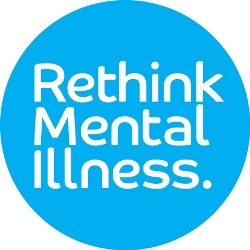The Substance Abuse and Mental Health Services Administration is a branch of the U.S. Department of Health and Human Services. SAMHSA is charged with improving the quality and availability of treatment and rehabilitative services in order to reduce illness, death, disability, and the cost to society resulting from substance abuse and mental illnesses. The Administrator of SAMHSA reports directly to the Secretary of the U.S. Department of Health and Human Services. SAMHSA's headquarters building is located outside of Rockville, Maryland.

Mind is a mental health charity in England and Wales. Founded in 1946 as the National Association for Mental Health (NAMH), it celebrated its 70th anniversary in 2016.

Primary care trusts (PCTs) were part of the National Health Service in England from 2001 to 2013. PCTs were largely administrative bodies, responsible for commissioning primary, community and secondary health services from providers. Until 31 May 2011, they also provided community health services directly. Collectively PCTs were responsible for spending around 80 per cent of the total NHS budget. Primary care trusts were abolished on 31 March 2013 as part of the Health and Social Care Act 2012, with their work taken over by clinical commissioning groups.

Rethink Mental Illness Is a British charity that seeks to improve the lives of people severely affected by mental illness through their networks of local groups and services, information and campaigns. Its stated goal is to make sure everyone severely affected by mental illness has a good quality of life.
The Health and Social Care Select Committee is a Departmental Select Committee of the British House of Commons, the lower house of the United Kingdom Parliament. Its remit is to examine the policy, administration and expenditure of the Department of Health and Social Care (DHSC) and its associated agencies and public bodies. The Clerks of the Committee are Previn Desai and Joanna Dodd.
The recovery model, recovery approach or psychological recovery is an approach to mental disorder or substance dependence that emphasizes and supports a person's potential for recovery. Recovery is generally seen in this model as a personal journey rather than a set outcome, and one that may involve developing hope, a secure base and sense of self, supportive relationships, empowerment, social inclusion, coping skills, and meaning. Recovery sees symptoms as a continuum of the norm rather than an aberration and rejects sane-insane dichotomy.
The Mental Health Commission of Canada (MHCC) is a national non-profit organization created by the Canadian government in 2007 in response to a senate committee tasked to study mental health, mental illness, and addiction. The committee appointed Michael J. L. Kirby as the first chairperson. The MHCC was endorsed by all the provinces and territories with exception to Quebec. The Commission is funded by Health Canada and has a ten-year mandate enforced through a sunset clause. On 21 April 2015, Minister of Finance Joe Oliver announced that the 2015 federal budget calls for the renewal of the MHCC for another ten-year mandate starting in 2017-2018.

The Mental Health Act 2007 is an Act of the Parliament of the United Kingdom. It amended the Mental Health Act 1983 and the Mental Capacity Act 2005. It applies to people residing in England and Wales. Most of the Act was implemented on 3 November 2008.

South London and Maudsley NHS Foundation Trust, also known as SLaM, is an NHS foundation trust based in London, England, which specialises in mental health. It comprises four psychiatric hospitals, the Ladywell Unit based at University Hospital Lewisham, and over 100 community sites and 300 clinical teams. SLaM forms part of the institutions that make up King's Health Partners, an academic health science centre.

The California Department of Public Health (CDPH) is the state department responsible for public health in California. It is a subdivision of the California Health and Human Services Agency. It enforces some of the laws in the California Health and Safety Codes, notably the licensing of some types of healthcare facilities. One of its functions is to oversee vital records operations throughout the state.
The Anna Freud Centre is a child mental health research, training and treatment centre located in London, United Kingdom. The Centre aims to transform current mental health provision in the UK by improving the quality, accessibility and effectiveness of treatment, bringing together leaders in neuroscience, mental health, social care and education. It is closely associated with University College London (UCL) and Yale University. The Princess of Wales currently serves as its royal patron.
Improving Access to Psychological Therapies (IAPT), also known as NHS Talking Therapies, for anxiety and depression, is a National Health Service initiative to provide more psychotherapy to the general population in England. It was developed and introduced by the Labour Party as a result of economic evaluations by Professor Lord Richard Layard, based on new therapy guidelines from the National Institute for Health and Care Excellence as promoted by clinical psychologist David M. Clark.
In England, social care is defined as the provision of social work, personal care, protection or social support services to children or adults in need or at risk, or adults with needs arising from illness, disability, old age or poverty. The main legal definitions flow from the National Health Service and Community Care Act 1990, with other provisions covering disability and responsibilities to informal carers. That provision may have one or more of the following aims: to protect people who use care services from abuse or neglect, to prevent deterioration of or promote physical or mental health, to promote independence and social inclusion, to improve opportunities and life chances, to strengthen families and to protect human rights in relation to people's social needs.

The Association of Mental Health Providers (AMHP), known until May 2017 as Mental Health Providers Forum (MHPF), is a registered charity based in London and the representative body for voluntary and community sector mental health organisations in England and Wales, working nationally and regionally to influence practice and policy. It aims to improve the range and quality of mental health services by increasing the involvement of the voluntary sector in delivering them, working in partnership with the wider sector and government agencies. Specific projects include the promotion of innovation in the sector, evidencing best practice to achieve the best outcomes for individuals and supporting recovery.

The National Collaborating Centre for Mental Health (NCCMH) is a collaboration between the Royal College of Psychiatrists and the Centre for Outcomes Research and Effectiveness at University College London (UCL). The NCCMH aims to promote the role of evidence synthesis in making informed judgments about healthcare policy. The NCCMH has a history of developing guidelines, conducting systematic reviews and developing implementation guidance for commissioners and service providers. Formed in 2001, on 1 April 2016 a new guideline development centre, the National Guideline Alliance, based at the Royal College of Obstetricians and Gynaecologists took over the clinical guideline programme that had been run by NCCMH.

Blackberry Hill Hospital is an NHS psychiatric hospital in Fishponds, Bristol, England, specialising in forensic mental health services, operated by the Avon and Wiltshire Mental Health Partnership NHS Trust. The hospital also offers drug and alcohol rehabilitation inpatient services, and is the base for a number of community mental health teams.

Vocational rehabilitation, also abbreviated VR or voc rehab, is a process which enables persons with functional, psychological, developmental, cognitive, and emotional disabilities, impairments or health disabilities to overcome barriers to accessing, maintaining, or returning to employment or other useful occupations.
Revolving Doors is a charitable organisation in the United Kingdom which works across England and Wales. Through research, policy and campaigning work, the organisation aims to improve services for people with multiple needs who are in repeat contact with the criminal justice system.
Total expenditure on health in Saint Lucia was 6.72% of the GDP in 2014. Health expenditure was at US$302 per capita in 2004. Infant mortality was at 12 per 100,000 births in 2005.
Sir James Louis John Appleby is a British psychiatrist who leads the National Suicide Prevention Strategy for England and directs the National Confidential Inquiry into Suicide and Homicide by People with Mental Illness. He runs the Centre for Mental Health and Safety at the University of Manchester.









